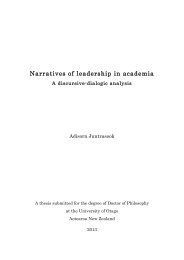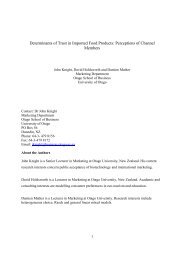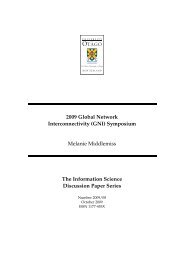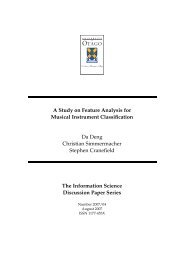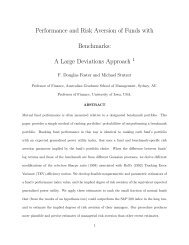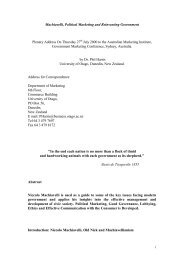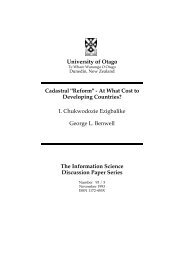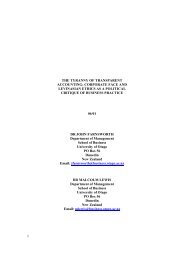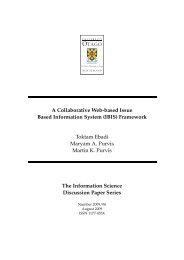Where is R2P grounded in international law? Anne-Marie Judson A ...
Where is R2P grounded in international law? Anne-Marie Judson A ...
Where is R2P grounded in international law? Anne-Marie Judson A ...
Create successful ePaper yourself
Turn your PDF publications into a flip-book with our unique Google optimized e-Paper software.
THE INTERNATIONAL COVENANT ON CIVIL AND POLITICAL RIGHTS<br />
The International Covenant on Civil and Political Rights (1966) 311 <strong>is</strong> considered<br />
customary <strong>law</strong> under the Human Rights framework. It covers citizen civil and<br />
political rights <strong>in</strong>clud<strong>in</strong>g the right to self-determ<strong>in</strong>ation. Th<strong>is</strong> right extends to all<br />
people and <strong>in</strong>cludes the right to determ<strong>in</strong>e their political status, the right to freely<br />
pursue their economic, social and cultural development and under no circumstances<br />
may people be deprived of their own means of subs<strong>is</strong>tence. 312 The state <strong>is</strong> responsible<br />
for ensur<strong>in</strong>g that these rights are protected through local leg<strong>is</strong>lation, which <strong>in</strong>cludes<br />
the right to a remedy through the local courts. Th<strong>is</strong> Covenant does not exclude<br />
prosecution from those who were work<strong>in</strong>g under the capacity of government<br />
<strong>in</strong>struments and th<strong>is</strong> right <strong>is</strong> non-d<strong>is</strong>crim<strong>in</strong>ative <strong>in</strong> that it does not exclude anyone<br />
from protection. 313 In some circumstances that are strictly limited to the state of<br />
emergency and the exigencies of the situation, derogations are allowed. These<br />
derogations are subject to certa<strong>in</strong> prov<strong>is</strong>ions.<br />
Firstly the state must not derogate from any obligations they currently have to other<br />
states, under Statutes, Charters or Covenants under <strong>in</strong>ternational <strong>law</strong>. Second, they<br />
must not be d<strong>is</strong>crim<strong>in</strong>ative on the grounds of race, colour, sex, language, religion or<br />
social orig<strong>in</strong>. Third, derogations do not <strong>in</strong>clude Articles 6, 7, 8 (paragraphs 1 and 2),<br />
11, 15, 16 and 18 of th<strong>is</strong> Covenant. Fourth, the derogat<strong>in</strong>g state must <strong>in</strong>form all other<br />
parties through the Secretary-General that they <strong>in</strong>tend to derogate from certa<strong>in</strong><br />
prov<strong>is</strong>ions. Fifth, they must say which prov<strong>is</strong>ions they <strong>in</strong>tend to derogate from. Sixth,<br />
they must provide the reasons why they are derogat<strong>in</strong>g. Lastly they must <strong>in</strong>form the<br />
Secretary-General of the date they term<strong>in</strong>ated the derogations. 314 Article 5 (2) states<br />
“there shall be no restriction or derogation from any of the fundamental rights<br />
recognized (…) pursuant to <strong>law</strong>, conventions, regulations or custom on the pretext<br />
311 United Nations. (1966). The International Covenant on Civil and Political Rights . New York : <br />
United Nations. http://treaties.un.org/doc/treaties/1976/03/19760323%2006-‐<br />
17%20am/ch_iv_04.pdf can be found on the United Nations website under Treaties, true copies, <br />
Chapter iv, Human rights, Last accessed 3 rd October 2011 <br />
312 See articles 1 and 1(2) page 1 <br />
313 Articles 2 (1) – 2(3) page 2 <br />
314 See articles 3 -‐5 page 3 <br />
<br />
98



